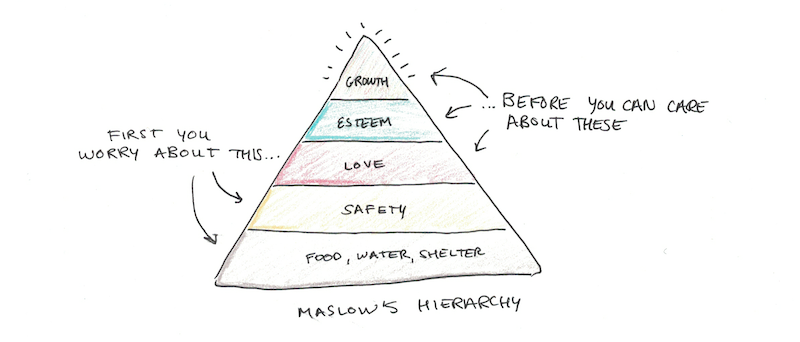Ambition is a concept that gets mixed reactions.
Some people see it as the essence of progress, virtue and character. Those with ambition take action, set goals and build meaningful things. Without ambition, nothing would get done. In this sense, ambition is synonymous with vision, the opposite of laziness.
Other people view it as the essence of corruption. Those with ambition take from others, cheat, swindle and are ruthless in getting what they want (especially to those who get in their way). Without ambition, the world would be a kinder, gentler place. In this sense, ambition is synonymous with greed, the opposite of contentment.
To me it seems that the latter problems of ambition are mostly because ambition is a selfish pursuit. In other words, ambition is bad when it centers around your ego and self-aggrandizement.
Is Selfless Ambition Possible?
Ambition is a motivation to achieve things. Motivations can have many possible sources.
It could be from a creative urge. An ambitious novelist might craft an engaging epic because the vision pulls her forward.
It could be from a desire to change the world for the better. An inventor may develop a new energy source, transportation mechanism or just a better mousetrap because they want to improve the world they live in.
Alternatively, it can also come from a desire to become wealthy, famous or respected.

Some people argue that these selfish motivations truly predominate. That our more virtuous intentions are merely social masks we put on to conceal our ego-driven intents. Ambition, in this view, is always ego-driven, whether we recognize it or not.
Others would argue that, it is true that most motivations are selfish by default, this is not the only option. Turning down your own craving can allow nobler motivations to take over. Thus an ambition to serve might flourish in a mind that isn’t constantly plagued by its own dissatisfaction.
Cultivating the Right Type of Ambition
I think that ambition combines a few different qualities, some of them good, others more questionable. Which predominates can tell you about the kind of ambition they pursue and whether or not it will benefit them or the world around them.
Confidence seems to be a common ingredient in ambition. Believing one can do things which are hard to accomplish seems to be a prerequisite for any kind of ambition.
Vision is also important. Being able to imagine an alternative state of affairs and create it in enough detail so that you can venture forward and realize it is also essential.
Tenacity and persistence matter too. No truly ambitious effort will succeed without friction, so if you stop at the first sign of resistence, you won’t achieve anything.
These three qualities seem rather positive, or at least not obviously negative. However ambition also gets tied up with a few other drives:
Hunger and greed. Ambitious people often want more than others. This greater appetite may drive good deeds, but it can also gnaw away on the inside as they are ever dissatisfied with what would satiate normal people.
Ruthlessness and immorality. Ambition can also be seen in people who are willing to cause harm to others, or sacrifice other values to achieve their ends. In moderate cases this is the person who works non-stop and neglects his family. In extreme cases, this is the person who will betray a friend or harm innocent people to reach her goal.

My sense is that virtuous ambition tends to promote the former three qualities, while minimizing the latter.
Are Purely Selfless Motivations Possible?
I don’t know whether it’s possible to achieve genuine selflessness. There’s a strong argument that many behaviors we feel are virtuous conceal a selfish interior. Charity, being nice to your family, following rules and helping society, may boil down to a selfish calculus beneath our conscious awareness.
Regardless of whether this is the case, however, I think there’s definitely different qualities of motivations. Even if all motivations have some grounding in selfishness, there’s a world of difference between giving to charity in the unconscious desire to appear generous, than stealing from others to enrich yourself.
For ambition to be without ego, in my view, it would avoid these latter types of selfish motivations.
The Goal of Ambition Without Ego
My own sense is that what motivates your actions tends to come from how you feel inside. If you feel contented, satisfied and happy, you’re more likely to pursue ambitions that come from desires to serve, create or challenge yourself. If you’re deprived and dissatisfied, your ambitions may come from a deeper need.
While I think there’s a lot of flaws in Maslow’s Hierarchy of Needs, this does roughly correspond with the pyramid he first set forth:

The only difference of opinion I would note is that it seems many people are still obsessed with “lower level” needs well beyond what they technically need to sustain themselves. The person who eats to excess, constantly depends on approval of others or wants to seem successful, may have objectively filled those lower requirements long ago, but keeps chasing the same desires.
Living well, therefore, seems to involve a kind of double strategy. One, we need to strive to meet our expectations so that extreme deprivation doesn’t turn us nasty and brutish in our motivations. At the same time, we also need to cultivate a kind of ambition that doesn’t depend on renewing already-sated hungers for its motive force.

 I'm a Wall Street Journal bestselling author, podcast host, computer programmer and an avid reader. Since 2006, I've published weekly essays on this website to help people like you learn and think better. My work has been featured in The New York Times, BBC, TEDx, Pocket, Business Insider and more. I don't promise I have all the answers, just a place to start.
I'm a Wall Street Journal bestselling author, podcast host, computer programmer and an avid reader. Since 2006, I've published weekly essays on this website to help people like you learn and think better. My work has been featured in The New York Times, BBC, TEDx, Pocket, Business Insider and more. I don't promise I have all the answers, just a place to start.